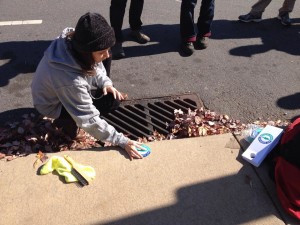BREAKING: Asheville coal plant retirement signals end to coal ash pollution

Continued Reliance on Fossil Fuels Troubling to the Region
May 19, 2015, Asheville, NC – In an announcement today, Duke Energy revealed a proposal to retire the Asheville Plant, a 414 MW nameplate capacity (376 MW operating capacity) coal-fired power plant located near Asheville, North Carolina. The announcement includes plans to replace coal-fired power at the plant with new, larger gas fired generation options. Additionally, Duke has committed to building a solar farm on the site of coal ash ponds near the plant. Today’s announcement marks the 190th coal plant announced for retirement since the beginning of the Beyond Coal campaign.
In Response to Today’s Announcement MountainTrue, Sierra Club, Southern Environmental Law Center and Waterkeeper Alliance issued the following joint statement:
“For the last three years the Asheville Beyond Coal Campaign and thousands of individuals have called on Duke Energy to transition our region off of coal. This has been a struggle to protect our health, our families and our communities. It has required tireless effort to pursue a brighter vision for Asheville. We can declare victory in securing closure of the plant, for it means an end is in sight for the air, water, and carbon pollution from this plant, but Duke’s announcement to build new gas is inconsistent with the clean energy vision we have called for.
“While we applaud Duke’s decision to retire the Asheville plant, Duke failed to hear what people wanted in its place. Folks want a bright future that supports clean energy, not a giant gas plant polluting Asheville for another 30 years. North Carolina has the opportunity to be a leader in clean energy generation through aggressive investments in solar power and energy efficiency, and Duke Energy must be a partner in that effort – but moves like this deeply undermine the ability to bring online clean, reliable 21st century energy options that will create good jobs right here at home.
“North Carolinians deserve clean water and home grown electricity options that invest in local communities and create jobs here in our community. North Carolina has some of the best potential in the nation to harvest the sun for our power needs but Duke Energy must be a partner in that investment if the state is ever to see the real benefits of clean energy. While the proposed solar farm is a step in the right direction, it falls far short of the investment needed to move the region to a clean energy future.
“Additionally, this announcement does nothing to address evidence of unsafe air pollution from the Asheville Plant; under Duke’s proposal, the plant could continue to emit sulfur dioxide at levels that threaten public health until the coal-burning units are retired.
“The retirement of the Asheville Plant is a step in the right direction, but it is a half measure, undermined by continuing reliance on an economically unpredictable and polluting source of power. Duke can do better, and our community deserves better. We will continue to use every tool at our disposal to fight for clean energy solutions for Western North Carolina.”






